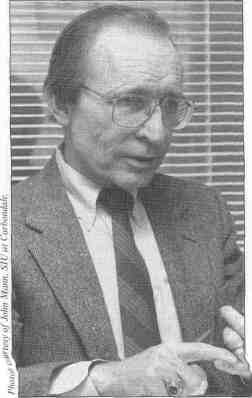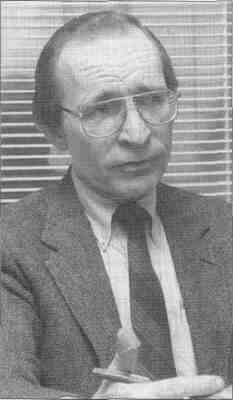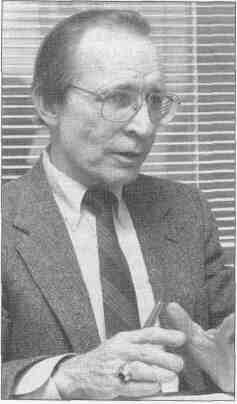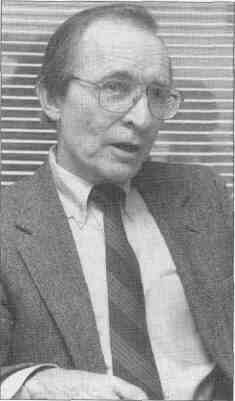DIALOGUE
An interview with John S. Jackson III
Illinois' primary is
representative of the nation
by Megan Lynch
Illinois rarely strays far from
the national presidential vote.
Jimmy Carter in '76 and
Woodrow Wilson in '16 were
the only presidents elected this
century without carrying Illinois.
And, even then, we were only a
couple of percentage points off

SIUC political scientist John S. Jackson III
studies the way our presidents are chosen.
|
Political scientist John S. Jackson III
thinks the presidential primary sweepstakes give too much weight to New
Hampshire. "They're weird voters," he
says. Illinois, he argues, is more representative of national trends than that
less diverse northeastern state (which
held its primary February 20) or the
small state of Iowa (which held its caucuses February 12).
But Jackson, dean of the College of
Liberal Arts at Southern Illinois University at Carbondale, says he can prove
the complaint isn't mere chauvinism. In
fact, he co-wrote a book on the subject,
The Making of a Primary: The Illinois
Presidential Primary — 1912-1992,
with political scientist David H. Everson
of the University of Illinois at Springfield and Nancy L. Clayton, a doctoral
candidate at SIU.
The book traces the rise of primaries
(and the decline of conventions) as a
means for choosing party nominees.
Jackson says Illinois historically has
been a "bellwether" state in presidential
elections. We also helped spark the shift
to primaries.
Q. How is Illinois more like the
nation than New Hampshire?
A. By any dimension you measure,
the people of Illinois are more representative of the nation: the mixture of
the economy between urban and rural,
between manufacturing and agriculture; the racial, ethnic, minority makeup; the big cities versus the farms. New
Hampshire and Iowa are in no way a
microcosm of the nation.
Q. Would it alter the politics of Illinois if we had the intense media exposure of Iowa and New Hampshire?
A. It might or might not. But I
think it almost certainly would alter
the politics of the presidential selection process. Illinois would alter it in a
positive way, in my estimation, because
it would be a more fair test of the
strengths and weaknesses of the candidates, particularly when you combined
Illinois with Wisconsin, Ohio and
Michigan. That's a pretty good test of
who's going to be a strong candidate
for president.
|
Q. Would it get us better presidents?
A. That's a terribly important question. And probably impossible to
prove, because "better" lies in the eyes
of the beholder. It would get us more
representative candidates; that is, candidates with limited appeal would have
less chance of winning these big states
than they now have of emerging
because they're the flavor-of-the-day in
New Hampshire.
Q. Is Illinois similar to the rest of the
nation in voting behavior?
A. Absolutely. Illinois rarely strays
significantly from the national outcome. Jimmy Carter in '76 and
Woodrow Wilson in 1916 were the only
two presidents elected this century
without carrying Illinois. And, even
though Illinois didn't vote 'correctly'
in the win-loss column in those years,
we were only a couple of percentage
points off.
Q. Is voter turnout in the two major
parties similar to the national trend?
A. It's very close to the national
trend. And the rest of that story is that
Illinois has two very competitive parties. A lot of states only have one party, or a party and a half. That, too,
illustrates the larger argument. Again
— to beat up on New Hampshire— New Hampshire always votes for the
Republicans. It's a very unusual state.
Q. Between 1912 and 1968, primaries weren't the biggest factor in
choosing nominees. What brought about
the change?
30 * March 1996 Illinois Issues

|
A. If you had to put a single causal
point on it, you'd say the Democratic
Party convention held in the great city
of Chicago in 1968. That convention,
as you know, was so divisive that it's
become part of our political lore. It
was the riots in the streets, the hippies,
the Chicago Seven [trial]. If you've
seen any of the media coverage, it was
just awful, very conflict-ridden. It was
the undoing of Hubert Humphrey's
possibilities for winning the presidency
against Richard Nixon.
Out of that, the Democratic Party
resolved to start some changes internally so that people at the grass-roots
level would have more of a role in the
selection of presidential candidates.
That led to the significant increase
in the use of presidential primaries,
and, thus, to the significant enhancement of their role in the selection of
our presidential nominees. So, it really
all started in the streets of Chicago in
1968.
Q. Was it easier or better when the
conventions played a bigger role in
choosing the candidates?
A. It was easier in the sense that
there were fewer players. The political
leadership, the party leaders, the political elites could make the deals. The
big city mayors in the case of the
Democratic Party and the big state
governors in the case of the Republican Party could get together at the
convention. And if someone's bandwagon was rolling, they'd throw their
whole state delegation to that person
and push them over the top in a big
dramatic movement. It was easier in
the narrow sense that a few players
had a lot of power.
|
|
Now, we've got literally hundreds of
thousands of voters all playing a role
in that mixture of who's going to win
the primaries and who's going to win
the caucuses. But what that's done is to
downgrade the importance of the
national conventions. By the time of
the national conventions, we know
who the nominee is going to be.
We only have the question of how
bloody it's going to be, or what will the
platform fights be. The Republicans
are going to have a big fight over abortion rights this time, for example.
Those kinds of things can still hurt the
party, but the question of who's going
to be the Republican nominee will be
long since settled by the time they get
to San Diego in August.
Q. Did the changes after 1968 and
1972 also change the way the campaigns were run?
A. Absolutely. Campaign strategy
used to be almost exclusively directed
toward the political party leaders — people who controlled blocks of delegates, like Mayor Richard J. Daley or
like a governor. You put together
endorsements of leading political figures, you made trades with them, deals
with them.
If you entered primaries, it was to
show you had some grass-roots
appeal: John Kennedy showing that
even though he was a Catholic he
could win in very Protestant West Virginia. You had a point to make to the
party leaders, who then decided if you
had done well in the primaries.
The media had relatively little role
to play in all of that, as did the grassroots voters. All of that's turned
upside down now. The grass-roots voters and the media drive the whole system now. You've got to win hundreds
and thousands and millions of voters
now. And that's the American tradition. Although, by the way, we're the
only nation in the world to do it that
way.
|
Nominating Calendar
This year, most of the primaries
and caucuses are bunched
into this month. In fact, political
scientist John Jackson notes that
three-quarters of the delegates on
both sides will be selected by the
end of March. Jackson, who has
studied the presidential selection
process, is the dean of the College
of Liberal Arts at Southern Illinois
University at Carbondale.
The Illinois primary will be
held March 19. We'll be joined by
Michigan, Ohio and Wisconsin.
This month's primary sweep
begins on the 2nd in South Carolina
and ends with California on
the 26th. In between, primaries
will be held in: Colorado, Connecticut,
Georgia, Maine, Maryland, Massachusetts,
Rhode Island, Vermont, New York
Florida, Mississippi, Oklahoma,
Oregon, Tennessee, Texas and
Washington. Another four states
will hold caucuses: Minnesota,
Missouri, Nevada and Utah.
Pennsylvania will hold a primary
in April. Six states and the District
of Columbia will hold primaries
in May: Indiana, North Carolina,
Nebraska, West Virginia,
Arkansas and Kentucky. Idaho
will hold a caucus that month.
Alabama, Montana, New Jersey
and New Mexico will hold their
primaries in June. The states of
Virginia and Wyoming have not
settled on dates.
|
Illinois Issues March 1996 * 31
DIALOGUE

Approximately three-quarters of the
delegates will be selected by the end of March.

|
Q. What has it done to the state's
political parties to have these big campaigns come in to organize?
A. I think the general answer is that
it has undermined the parties to some
extent. In many states it's pretty clear.
It's a little more complicated than that
in Illinois.
Our strong parties mean that when
the campaigns come in they try to
recruit strong party leaders. For example, right now Gov. Jim Edgar is in
favor of Sen. Bob Dole, but Secretary
of State George Ryan [had] endorsed
and [was] working for Phil Gramm. So
the national organizations come into
Illinois and try to recruit as many Illinois politicians as they can, unlike
some states where they have totally cut
out the party.
But, having said that, yes, the party
has a lesser role than it used to have.
Q. What will Illinois' role be with a
primary that's shared on March 19 with
several other Midwestern states?
A. The cycle started out being
spread from February through June.
The big states, California and New
York, for example, got tired of not
counting in this. By the time it got to
New York and California, it was all
over. And they kept saying, "Hey, this
is not fair. We're the biggest states in
the union, and little New Hampshire
has decided the outcome and four
months later we're superfluous."
So California and New York and a
number of other big states moved
back to March this time. That means
approximately three-quarters of the
delegates on both sides will be selected
by the end of March. It's going to be
over by the end of March.
Q. Do you think there will ever be a
day when all the primaries will be held
at approximately the same time?
A. There's a de facto movement in
that direction now. And there is the
movement for a national primary that
would be a single day. A lot of people
favor that, but there are some problems with it.
I think what's going to happen is
more likely a window of about two
months, with several de facto regional
primaries. The Super Tuesday primary,
which is the week before Illinois, is
effectively a southern primary now,
with some add-ons, March 19 has, by
happenstance, become a Midwestern
primary.
Q. What do you think it will take to
get the national media's attention away
from New Hampshire and Iowa?
|
|
For More
Information
John Jackson has another book
coming out this year on presidential politics. He's written The Politics of Presidential Selection with
William Crotty. And Congressional Quarterly serves up profiles of
the presidential contenders in its
Candidates '96. CQ has also published a Guide to the 1996 Presidential Election by Michael L.
Goldstein.
Meanwhile, Charles Lewis
takes a close look at the financial
realities of the race to the White
House. The Buying of the President examines sources of contributions to the major candidates.
For a more philosophical look
at leadership and governing, U.S.
Sen. Bill (maybe he will run for
president, maybe he won't)
Bradley has a book out — Time
Present, Time Past: A Memoir.
And if you want to get serious
about this, delve into Garry Wills'
book, Certain Trumpets: The Call
of Leaders.
Then you may be ready for fun
with the fictional Primary Colors,
published anonymously. Insiders
say it's modeled after President
Bill Clinton's 1992 race.
|
32 * March 1996 Illinois Issues
|
A. That's a good question. The fact
is the person who won the New Hampshire primary for the Democrats last
time did not win the presidential nomination. Paul Tsongas won. So New
Hampshire is not quite the kingmaker
it once was.
A couple of losses like that will
undercut their validity to some extent.
What I think needs to happen is for the
parties to say to Iowa and New Hampshire, "You can go on the following
day, and so will several other states."
And that will dilute their importance
and they'll go away. My favorite outcome anyway.
Q. I'm sure it's going to be interesting for you to see the results of this primary, to see if it does follow the pattern
that's been set.
A. I see Illinois as having two roles.
One is what we call a confirming role
for a front runner who's already looking good but needs a big win.
That was the pattern for Bill Clinton in 1992. Clinton did not have the
nomination wrapped up when he came
to Illinois. He needed Illinois and
Michigan to confirm that he could win
outside the South.
He had already lost New Hampshire. He then won in the South, in the
Super Primary, but he needed a big
state like us. And we were a tremendous victory for Bill Clinton in '92,
confirming his front-runner status,
confirming his momentum, and he was
not to be stopped after that.
Or, sometimes it confirms that a
person is on the ropes and is going to
lose. That's what happened to Bob
Dole against George Bush in '88. It
can be absolutely devastating if you're
like Sen. Dole in '88 and needed to win
in the Midwest and you lose to George
Bush. It was all over for him.
So it's had both effects. It's knocked
out somebody who was already on the
ropes; it's confirmed front-runner status for other people. *
Megan Lynch is a reporter for public radio station WSIU in Carbondale.
|
About the Book
The Making of a Primary: The Illinois Presidential
Primary —1912-1992, by John S. Jackson III, David
H. Everson and Nancy L. Clayton, was published this
year by the Institute for Public Affairs at the University
of Illinois at Springfield.
Even if Iowa and New Hampshire were combined into a state
"called "New Iowashire," Illinois
would be a better barometer of the
nation, according to these three
scholars.
That mythic combination is
explored in their book, which interprets the role of Illinois' primary
process from 1912 to 1992. In fact,
Illinois is the litmus test for candidates, according to The Making of a
Primary. Only two times between
1972 and 1992 did a candidate
secure Illinois' votes without winning the national party nomination.
Both were Democrats. The first, in
1972, was U.S. Sen. Edmund
Muskie of Maine. The second was
Illinois' favorite son, Paul Simon,
Iowa won the state's primary in
1988.
In trying to show how Illinois'
primary can make or break a candidate the authors outline each one
since 1912. Along the way, they
highlight some interesting
moments.
Illinois was one of only a dozen
states to initiate presidential primaries in 1912. In that year, Democratic voters in the state put their
marks beside Champ Clark. Republicans supported Theodore Roosevelt. Neither were selected at the
national nominating conventions.
The eventual nominees were Democrat Woodrow Wilson and Republican William Howard Taft. Illinois
voters had very little influence over
which candidate became the party
nominee at their respective party
conventions. Blocks of delegates
were not chosen by the voters based
on candidate preference. Instead,
state party leaders organized their
faithful for political deals at the
nominating conventions.
According to the authors, 1968
might be the only year in primary
history that the national media's
lens was focused on Illinois instead
of New Hampshire and Iowa. That
year, Chicago erupted around the
Democratic National Convention.
The problems at the convention
prompted the Democratic National
Committee to institute new guidelines in 1970 for conventions and
"delegate selection.
In 1972 (the year George McGovern won the Democratic nomination), the state's Democrats, led by
Chicago Mayor Richard J. Daley,
wanted to assert control. They
managed to secure uncommitted
delegates in a third of the state's
congressional districts. But it was
fruitless effort. Daley and his delegates were not seated at the convention in Miami. The incident resulted in a U.S. Supreme Court ruling
the following year that essentially
gave control of delegate qualifications to the national parties, regardless of state law.
The primaries became a major
factor in the presidential elections
in 1976. While the nominating conventions are still a good venue for
parties to hammer out platform
decisions, the conventions have
become secondary to primaries and
caucuses when it comes to selecting
the party nominees.
Megan Lynch
|
Illinois Issues March 1996 * 33
|

